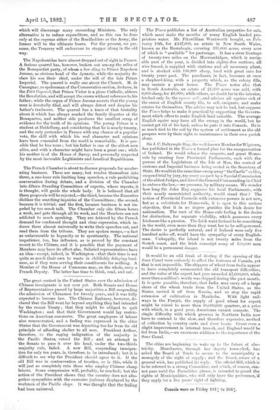The great contest in the United States over the admission
of -Chinese immigrants is not over yet. Both Senate and House -of Representatives passed by large majorities a Bill suspending the admission of Chinamen for twenty years, and it was fully expected to become law. The Chinese Embassy, however, de- clared that the Bill went far beyond anything they had intended by the recent Treaty ; that they might be obliged to quit Washington ; and that their Government would lay restric- tions on American commerce. The great employers of labour -also remonstrated, and a feeling was expressed in the older -States that the Government was departing too far from its old principle of affording shelter to all men. President Arthur, therefore, to the raging indignation of the majority in -the Pacific States, vetoed the Bill ; and an attempt in the Senate to pass it over his head, under the two-thirds majority rule, failed. A new Bill, suspending immigra- tion for only ten years, is, therefore, to be introduced ; but it is difficult to see why the President should agree to it. If the old Bill was in contravention of treaties, so is this, while it will just as completely rain those who employ Chinese cheap labour. Some compromise will, probably, be reached ; but the action of the President shows that the country does not alto- gether sympathise with the excessive jealousy displayed by the workmen of the Pacific slope. It was thought that the feeling had been universal.
The Times publishes a list of Australian properties for sale, which must make the mouths of many English landed pro- prietors water. Mr. Fitzwilliam Wentworth bought, on Feb- ruary 10th, for £447,000, an estate in New South Wales, known as the Burrabogie, covering 335,000 acres, every acre of which is " available " for pasturage. It has a river frontage of twenty-two miles on the Murrumbidgee, which is navig- able part of the year, is divided into eighty-fire sections, all wire fenced, is supplied with stations and all necessary plant, and is stocked with 138,889 sheep, bred with great care for twenty years past. The purchaser, in fact, becomes at once a shepherd-king, with a property which, as the colony fills, may sustain a great house. The Times notes also that in South Australia, an estate of 21,300 acres was sold, with 8,000 sheep, for £8,000; while others, no doubt far in the interior,
fetched only 5s. the synare and advises all squires sick of the ennui of English county life, to sell, emigrate, and make estates for themselves. The advice may not be bad, but suppose the Times helps to make it practical by supporting the Govern- ment which offers to make English land saleable. The average English squire may have all the energy in the world, but he cannot get rid of his land, unless he puts it into Consols. He is as much tied to the soil by the system of settlement as the old paupers were by their right to maintenance in their own parish alone.


































 Previous page
Previous page